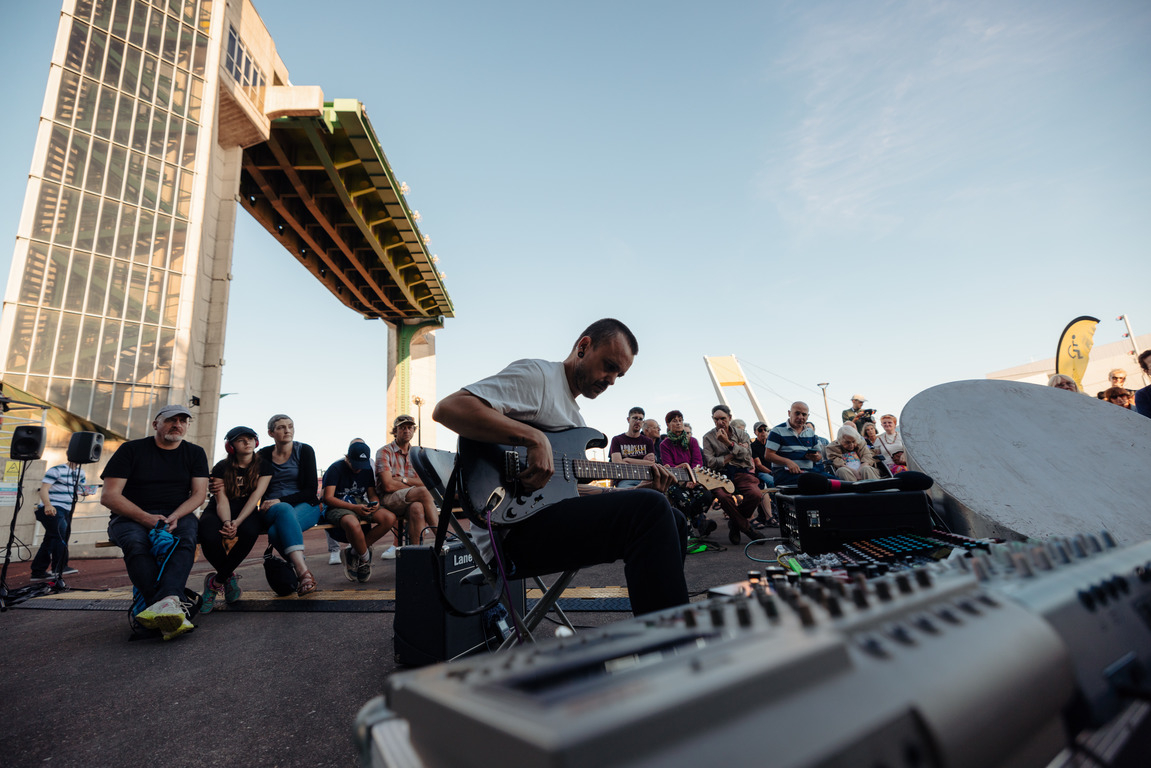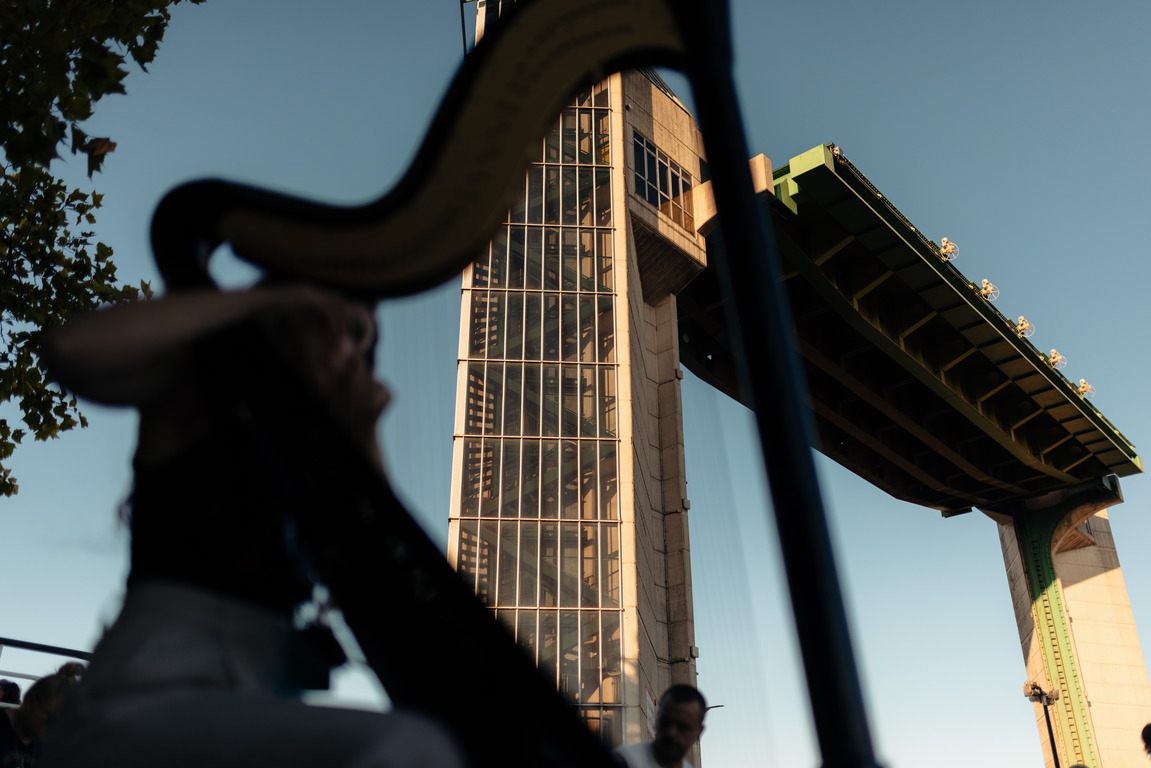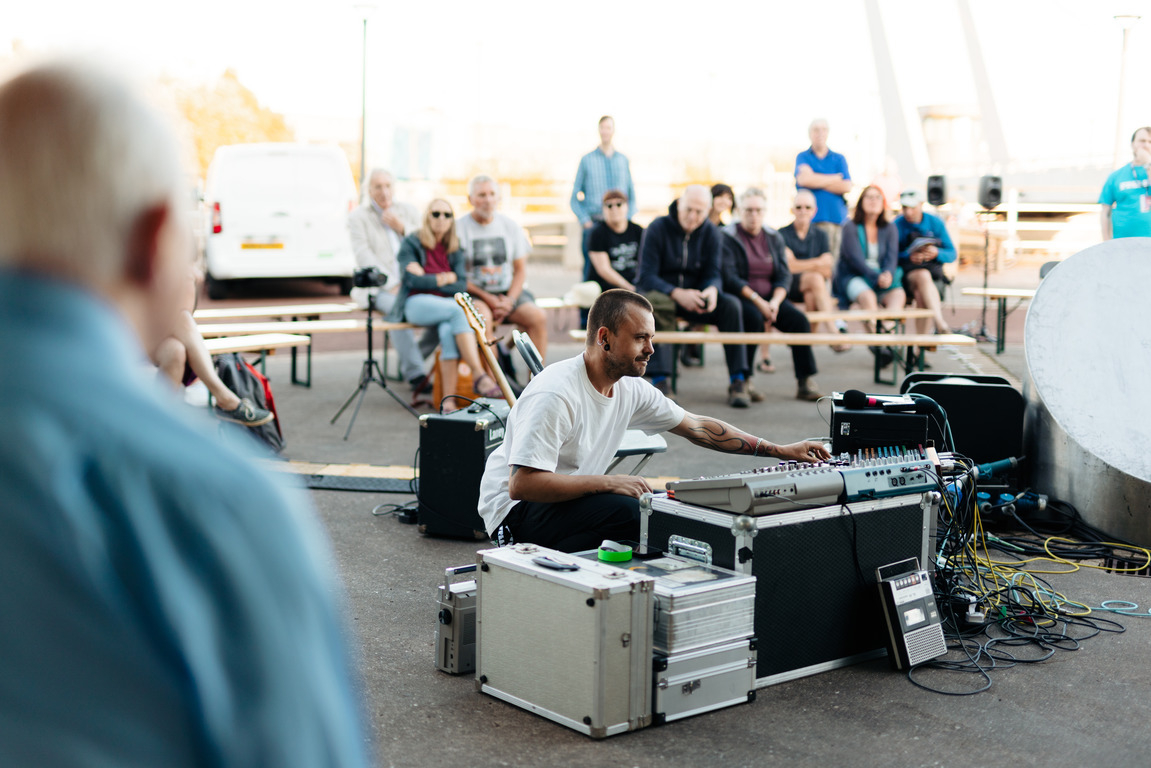Following his sensational performance of RESONANCE during our opening weekend, Lucy caught up with artist Stew Baxter to talk about the formation of his installation, his lockdown experience, and LIFE’s further involvement in Freedom Festival events.

As the drummer of post-punk band and Hull legends, LIFE, Stew Baxter never envisaged that he would conduct an experimental project using his own cassette recordings taken during lockdown, and two classically trained musicians. However, as one conversation led to another, and ideas bloomed, RESONANCE was born. Performed for a second-time at the tidal barrier on the festival’s opening weekend, benches were filled as listeners indulged in an hour of transient guitar and piano tones, ethereal chimes of a harp, and the raw sound of life in Hull. Ahead of LIFE’s Pizza Pop Party at Social tonight, Lucy discussed the impact of RESONANCE after its Freedom Festival debut, and how it has shaped the band’s new sound…
Stew: “I’ll be getting back at four in the morning, and then I’ve got a rehearsal at 9am for Freedom Festival so it’s all a bit chaotic! And then on Sunday I drive to Cumbria to play a festival, so there’s no time for stopping ha ha!”
Lucy: “No way! No time for stopping at all! I know how you feel ha ha! So just to start, can you sum up RESONANCE for me? What does it mean to you in your own words?”
Stew: “I suppose it’s an immersive experience really, it’s an opportunity to celebrate what I’ve been doing over the last few years with recorded and found-sound around the city. And to get to play with some really fantastic musicians to sort of improvise it is amazing, and for me it’s quite a personal thing because it was all born in lockdown then developed for Absolutely Cultured. The way I got into it was really just as a kind of way to self care and look after my mental health, so I didn’t intend for it to be a part of my career - it was just as an escape and a meditation. So, it was a way of finding a way to meditate since coming out of a depression.
Originally we did a performance at Rooted in Hull, and the good thing was I kind of did it without thinking about what the audience might experience. So, what I learnt from that was that there were all of these people that came and listened and experienced it at the same time as us, and what’s beautiful is that it became a shared experience. We haven’t really rehearsed it because it’s a lot of improvisation, and the way we’ve set it up means that you can be a part of it with the musicians, so everyone gets that kind of shared experience. And the feedback we’ve had was that the audience members also felt that they got a real calming sensation from it and could switch off for an hour or so…”
Lucy: “That’s amazing!”
Stew: “Some people were like, ‘Oh I’ve had a really shit week at work, and being in that room has just made me feel so much better,’ so I suppose the biggest thing for me is how my experience can now become an immersive experience for everybody.”
Lucy: “I think it’s mad how you can put so much faith into these musicians, using your own cassette recordings as a foundation, and then say, ‘Right, there’s your stimulus now go and do your thing!’”
Stew: “Yeah it’s completely out of my comfort zone, because I’m not a trained musician so I’m just basically creating a sound-bed, and the texture and the atmosphere, and then I’ve got two very accomplished musicians playing harp and piano who are very capable of just kind of locking-in and jamming over a kind of scale or whatever they find. So, it’s really challenged me because I’m not from that world, I’m from a punk background, and I don’t really understand music theory, so I can’t really just jam with people like that. I’ve had to find a way of creating a kind of drone and a kind of vibe that they can be inspired by.”
Lucy: “Yeah, like a stimulus for them to use?”
Stew: “Yeah completely, it’s been incredibly new and different for me.”
Lucy: “So, obviously you said when the event got announced that the piece was inspired by lockdown, why did you decide to take audio recordings using a cassette rather than through a microphone or more modernised recording technology?”
Stew: “I suppose, the reason why I decided to use cassette tape rather than digital recordings is because, parallel to the photography I do, I shoot film because it gets me away from the digital world, and in the same way, it means that with four-tracks on a tape you’re working with a kind of mechanic world and more sort of archaic pieces of equipment, which is what I was craving over lockdown. I do a lot of work, and a lot of music and a lot of design on a laptop, but this was a way of trying to get away from that. When I first started making music in the mid-90s when I was a kid, the first thing I had was a four-track cassette recorder because there were no computers.”
Lucy: “It’s mad isn’t it that music was made that way ha ha!”

Stew: “Yeah! And basically I’ve still got that cassette recorder that I used to record on, so what I did was, I was also wanting to re-connect with myself and my past, and there’s a real kind of romanticism in nostalgia, and cassettes for me are something I really feel comfortable around. So, I went back to the cassette recorder and tried to find something new to do, and that’s when I discovered that you could create tape loops and use that cassette as an instrument as opposed to a recording device. So really that’s what I learnt how to do, was to use it as an instrument, but it’s got limitations and repetitions and you might make a tape loop and it’s like five seconds long, but you just keep building on it and layering loops, and once you put it through effects it sort of transforms…I found myself for maybe three or four hours just listening to these tapes and maybe adding reverb to them through a guitar pedal or whatever and, before you know it, four hours had passed and I’d not looked at my phone. It’s been this amazing experience that’s made time stand still. So, I think one thing I took from lockdown, was that I was forced to stand still and I’ve never stood still before in my life because I’ve always been a very manic and busy person, and done too many things at once. Lockdown forced me to stop, so now I’m thinking about it coming out of lockdown, and I’m trying to preserve a bit of that stillness and the bits that I liked in finding those sounds that were freezing time, and creating a hypnotic trance.”
Lucy: “So, I guess learning how to be in the moment and maintaining those thoughts now out of lockdown?”
Stew: “Yeah completely. I’ve always really struggled to kind of meditate properly because I’ve got a very over-stimulated brain, with ADHD. So this has helped me just focus on something, and the hypnotic and calmness of this creates a necessary calm and gets rid of any anxiety that’s been building up over time.”
Lucy: “I think that’s the bit that drew me to it most, because of the way it must have impacted your mental health and the health of those that previewed the soundscape back in June. I mean we all shared the trauma that came with lockdown, so I think it’s really beautiful you used this as a way of channeling those feelings and your own memories of that time.”
Stew: “The creative process wasn’t even really that intense, because when I think back it was literally a survival technique for me. During the first lockdown I was really struggling with depression, and I didn’t know what was happening with things like the band because we were supposed to be on tour full-time, and then with lockdown that all got cancelled overnight. I was just trying to find something, and I didn’t even think about it - I was just drawn to things that would make me feel better which came from quite a naive and innocent place. That’s why I suppose it’s really amazing that Freedom Festival wanted us to kind of re-perform it, because they saw the value in what it also gives the audience. So, I suppose the elements that I didn’t realise would be so recognised by Freedom Festival, have actually become such a hugely important part of the programme. It’s been really nice to be asked back to do that - I mean I didn’t think we’d be able to do it again because it was sort of a one-off thing with it being improvised…During its creation we also worked with a young people and went round the gardens collecting found-sounds, and then I went round with Mark Slater and collected the sounds of Hull, and then we did the performance at Rooted and realised, ‘Oh sh*t we’re never going to be able to do that again, and that’s the end of the project!’ And then as artists we said that we should definitely do some more work together, because we didn’t think we’d be doing this again. So when Freedom said, ‘Would you be up for doing it again?’ we were like, ‘Totally yeah!’”
Lucy: “Yeah, so I guess in that way it would offer a completely new experience, because you might be using the same tapes as the last performance, but it’s still improvised so the soundscape will ultimately be different the second time round - that’s so cool!”
Stew: “Yeah so it’s kind of like an exclusive, because there never has been and there never will be the same performance again!”

Lucy: “Yeah exactly, that’s definitely the beauty of it! And just off the back of that, were there any particular moments during the creation of the installation or even building up to the last one that stand out for you?”
Stew: “Stand out moments - so in terms of some of the sounds that started it - would be, for example, there’s a recording that we took in the garden where we used a contact microphone which basically picks up any movement rather than noise. So you can use contact mics to kind of put it on a wall, and it’ll pick up the vibrations of the wall, but there are also other contact mics called hydrophones that go in the water and they pick up any sound or movement from under the water. And we put one of those mics in a hydrochloric plant which was kind of bubbling away and not really making much noise, but the contact mic picked up a really kind of progressive beat which is almost like a German techno beat - so it’s crazy that this really kind of aggressive and dark beat came from this found sound. And what it makes you realise is that if you look around you, there’s millions of sounds that you can’t hear, and they’re everywhere and you don’t even know they’re happening. So after this I kind of got really obsessed with the idea of just finding sounds that don’t exist to the naked ear ha ha! And what I like most about found sounds is that you can never do the same thing twice or record the same thing twice, and even if you go out now and record something on your iPhone on voice-memos, nobody in the world will ever have those sounds except you - they’re really really unique to you, and your space and your place and your home and to me that’s really powerful.”
Lucy: “Yeah and these sounds have always been there and when you think of it like that it’s kind of mind blowing!”
Stew: “I think another moment was when I invited Steph, in on the harp to come and kind of jam with me in the studio, and I put her harp through these analogue tape desks. And she was looking at seagulls out of the window and she just started playing, and she played for like 30 minutes and then stopped and she was like, ‘Wow, I’ve never felt like that before and I’ve never played like that before!’ It nearly made me cry because it was so overwhelming, so there’s been so many moments of inspiration over the creation of the project.”
Lucy: “That’s great mate, it’s so nice to see musicians come together in that space and share those meditative experiences together, because I think a lot of musicians just kind of go into a practise room, jam out for a little bit until they get bored, but with this you’re creating so many different ideas from strange things that you wouldn’t necessarily think of when you’re trying to write I don’t know, you’re latest single.”
Stew: “Yeah, you walk in the room not knowing what’s going to happen. And most of my experience has been in band rehearsals with bands, and even though we might have a jam it can be very regimented and then when you’ve finished the song you get a verse, chorus, bridge and then you play it like that every single time for three years. And I guess what I’m getting from this is the complete opposite to that, and I needed that balance in my life because by doing this solo work separate from the band and my career in such a different thing, it’s actually inspired me more in the band. I was kind of getting to a point where I was like, ‘I’ve been in bands for twenty years now and I need something different.’ Doing this has made me fall in love with the band more, and given me that balance that I needed.”
Lucy: “Yeah, you can definitely hear that in the new album, and I know you guys were taking quite a risk with the new record with the sound because it’s so drastically different to the last two, but in some songs you can really hear your influence in the layering that’s gone into them for example, Friends Without Names is one that stands out to me.”
Stew: “Yeah, definitely! And LIFE has also been involved in the Broken Orchestra’s Re:Score project which premiers on Friday too, so we scored one of those films that are shown. And we started recording it the day before we went on tour, and then we finished it in the van - like, yesterday I was recording Mez’s vocal in a hotel room! But the piece is nothing like anything we’ve done before, and I think you’ll agree with the album, it’s us trying to prove to everyone that we’re not just a BBC Radio 6 post-punk band, we’re very deeply creative people who can do other stuff. I think we’ve all been craving a bit of softness!”
Lucy: “Yeah ha ha! There’s only so many post-punk songs you can write until you’re like, ‘Right guys - time to switch it up a bit!’”
Stew: “Yeah, and I think after such a catastrophic couple of years, we all just needed a bit of softness you know?”
Lucy: “So just to finish, do you have any ideas about where you might want to take the project after its performance this weekend?”
Stew: “Yeah, I mean we’ve not got anything in concrete but me, Steph and Mark who I’ve invited in with me to accompany me in this project, as soon as we performed that first project at Rooted we all came out of it feeling really inspired, and were like, ‘So are we going to be a trio? Are we going to tour with this?’ So I guess in one way it’s inspired me, but it’s also inspired Steph and Mark to start their own projects and find their own sources of inspiration and create something from it. So now we’re just having conversations about what next? And one of the ideas that has surfaced includes inviting one of our friends who is a spoken word artist to work with us on a project, but we’re definitely going to be doing a lot of exciting stuff individually and as a group that’s for certain.”
Broken Orchestra in collaboration with LIFE: Re:Score previews at 20:30pm on Pier Street
Words by Lucy Tessier
Images by Tom Arran

